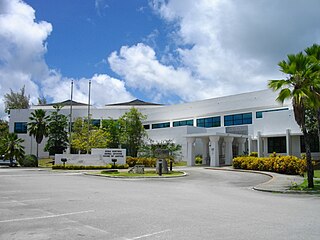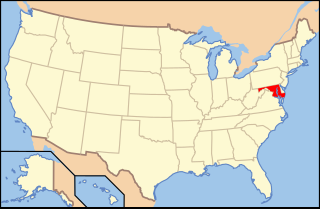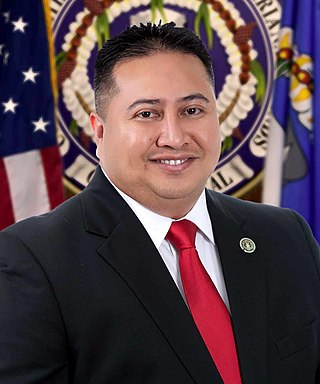
The District Court for the Northern Mariana Islands is a federal territorial court whose jurisdiction comprises the United States-affiliated Commonwealth of the Northern Mariana Islands (CNMI). It was established by Act of Congress in 1977, pursuant to an international agreement between the United States and the CNMI that brought the CNMI under United States sovereignty. The court began hearing cases in January 1978. The court regularly sits in Saipan but may sit elsewhere in the CNMI. The court has the same jurisdiction as United States district courts, including diversity jurisdiction and bankruptcy jurisdiction. However, the District Court is not an Article III U.S. District Court, and because of that its judge is appointed for a 10-year term instead of for life. Appeals are taken to the Ninth Circuit.

The CNMI Republican Party is a political party in the Northern Mariana Islands. The Northern Mariana Islands Republican Party is now associated with the United States Republican Party though no Northern Mariana Islands politicians have achieved high-ranking positions in the mainland United States.
Benjamin Taisacan Manglona was a Northern Marianan politician and civil engineer. He is the CNMI's longest serving elected official having served as a congressman, senator, and former mayor of Rota. Manglona served as the third lieutenant governor of the Northern Mariana Islands from 1990 to 1994 and as Mayor of Rota from 1998 to 2006.

The Northern Mariana Islands House of Representatives is the lower house of the Northern Mariana Islands Commonwealth Legislature.

The Northern Mariana Islands Senate is the upper house of the Northern Mariana Islands Commonwealth Legislature. The Senate consists of nine senators representing three senatorial districts, each a multi-member constituency with three senators.

The Supreme Court of the Commonwealth of the Northern Mariana Islands, 1 CMC § 3101, is the highest court of the United States Commonwealth of the Northern Mariana Islands (CNMI), exercising civil and criminal appellate jurisdiction over commonwealth law matters. It should not be confused with the District Court for the Northern Mariana Islands, which exercises jurisdiction over federal law. The Supreme Court sits in the capital, Saipan, and consists of a Chief Justice and two Associate Justices. The CNMI has no intermediate appellate commonwealth law court, which means that the CNMI Supreme Court hears appeals directly from the trial-level Superior Court.

Gun laws in California regulate the sale, possession, and use of firearms and ammunition in the state of California in the United States.

Gun laws in New York regulate the sale, possession, and use of firearms and ammunition in the U.S. state of New York, outside of New York City which has separate licensing regulations. New York's gun laws are among the most restrictive in the United States.

Gun laws in the District of Columbia regulate the sale, possession, and use of firearms and ammunition in Washington, D.C.

Gun laws in Illinois regulate the sale, possession, and use of firearms and ammunition in the state of Illinois in the United States.

Gun laws in Maryland regulate the sale, possession, and use of firearms and ammunition in the U.S. state of Maryland.

Gun laws in Pennsylvania regulate the sale, possession, and use of firearms and ammunition in the Commonwealth of Pennsylvania in the United States.
Same-sex marriage was legalized in the Northern Mariana Islands by the U.S. Supreme Court's landmark ruling in Obergefell v. Hodges on June 26, 2015, which struck down same-sex marriage bans nationwide. On June 29, Governor Eloy Inos issued a statement hailing the decision as "historic", and said he would work with the Attorney General and local officials to bring the U.S. territory into compliance. Attorney General Edward Manibusan issued a memorandum on June 30 confirming that the territory was bound by the court decision and said that marriage license forms would be changed to include same-sex couples.

Ralph Deleon Guerrero Torres is a Northern Marianan politician, who served as the ninth governor of the Northern Mariana Islands, from December 29, 2015, to January 9, 2023. He is a Republican from Saipan, Commonwealth of the Northern Mariana Islands (CNMI). The third longest-serving governor in CNMI history, Torres took office upon the death of Governor Eloy Inos on December 29, 2015, before being reelected as governor in his own right in 2018. He previously served as the tenth lieutenant governor, having been elected to that post in 2014.

Edward Eladio Manibusan is a Northern Marianan attorney and politician serving as the first elected Attorney General of the Northern Mariana Islands. He took office on January 12, 2015. He previously served in the position from July 1, 1989 to January 8, 1990 when it was a gubernatorial appointment.
Janet Ulloa Maratita is a politician from the Northern Mariana Islands and former member of the Northern Mariana Islands House of Representatives.

The 2022 Northern Mariana gubernatorial election took place on November 8, 2022, to elect the governor of the Northern Mariana Islands and the lieutenant governor of the Northern Mariana Islands to a four-year term in office. Because no candidate received 50% of the vote in the general election, the two highest-placing candidates advanced to a runoff election on November 25, 2022.

The 2024 United States House of Representatives election in the Northern Mariana Islands was held on Tuesday, November 5, 2024, to elect the territory's delegate to the United States House of Representatives in the 119th United States Congress. The Delegate, who is elected to a two-year term, represents the Northern Mariana Islands' at-large congressional district in the U.S. House of Representatives.

The 2024 Northern Mariana Islands general election was held on Tuesday, November 5, 2024, corresponding with the 2024 United States general elections. Voters in the Northern Mariana Islands chose the non-voting delegate to the United States House of Representatives, 3 seats in the Northern Mariana Islands Senate, all twenty seats in the Northern Mariana Islands House of Representatives, seats for the municipal council, and seats for the board of education.

Oscar Manglona Babauta is a politician from the Northern Marianas Islands. He served as the 12th Speaker of the Northern Mariana Islands House of Representatives during the 15th Commonwealth Legislature.















